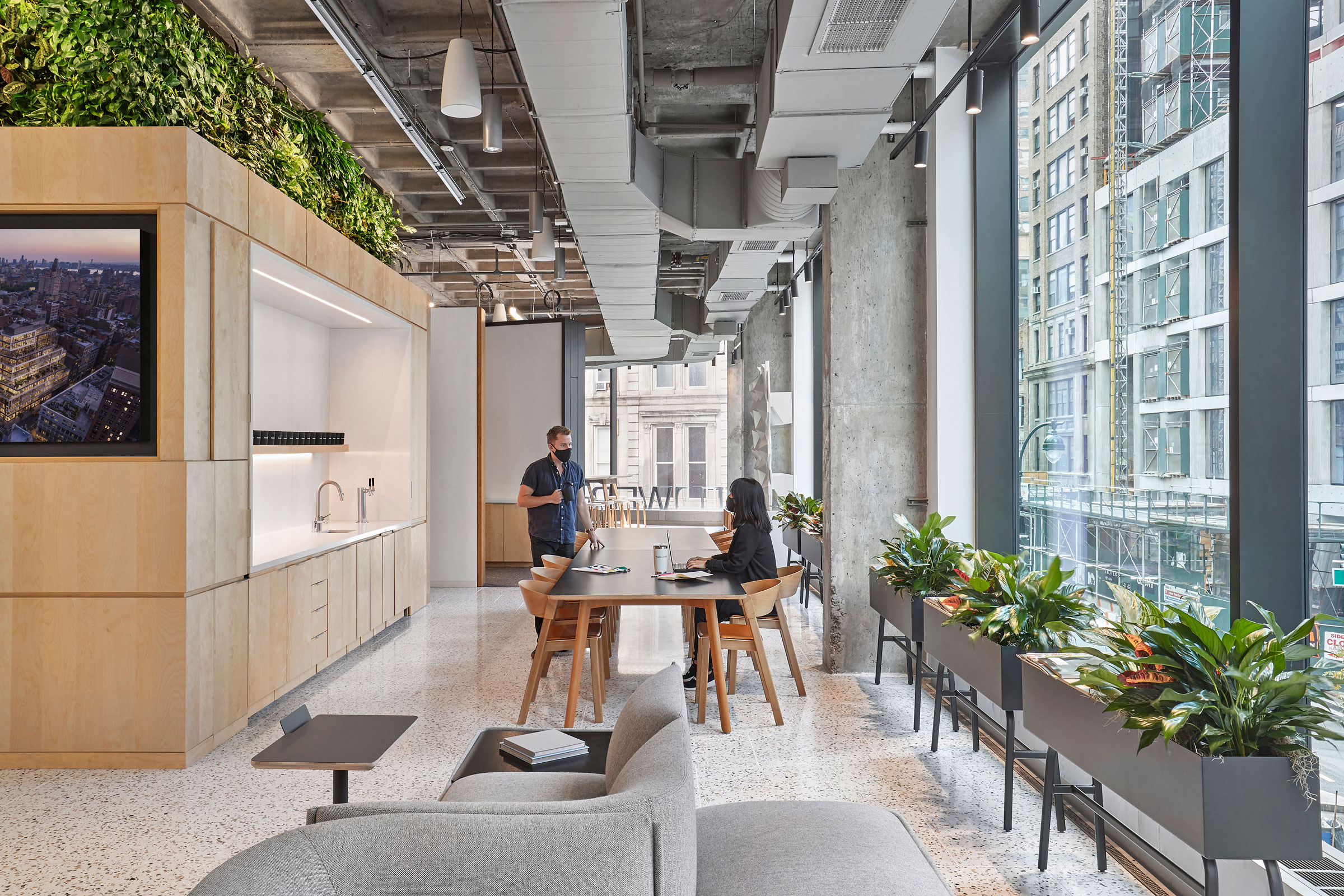Introduction
In the modern workplace, hybrid work models have emerged as a preferred approach for many organizations. This model blends remote work with traditional office-based work, offering employees the flexibility to work from home and the office. The rise of hybrid work environments is driven by the need for increased flexibility, better work-life balance, employee feedback, and the ability to adapt to changing circumstances.
Adaptable office furniture plays a crucial role in supporting these hybrid work models. It enables businesses to create dynamic work spaces that can be easily reconfigured to meet the needs of both in-office and remote employees. Whether it’s through modular furniture, ergonomic solutions, or tech-enabled desks, the right, comfortable office furniture can enhance productivity, foster collaboration, and ensure a seamless transition between different work modes. By investing in innovative office furniture, businesses can create a versatile and efficient workspace that supports the diverse needs of their workforce.
The Rise of Hybrid Work

The hybrid work environment has emerged as a revolutionary approach to modern work dynamics, blending the benefits of remote work with traditional office settings. This hybrid model often allows employees to split their time between working from home and in the office, fostering a balance that enhances productivity and employee satisfaction.
Recent statistics highlight this shift: a survey by McKinsey revealed that 52% of employees prefer a hybrid working model post-pandemic. The flexibility offered by hybrid work environments not only improves work-life balance but also reduces commuting time and operational costs for businesses.
Key Features of Hybrid Work Furniture
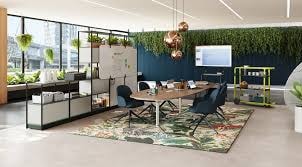
Hybrid work furniture is designed to meet the diverse needs of modern workplaces by offering flexibility, mobility, and multi-functionality. Flexibility is a crucial feature, allowing furniture to be easily reconfigured to accommodate different tasks and work styles. For example, desks and tables with adjustable heights can be used for both sitting and standing work, promoting better posture and comfort.
Mobility is another important aspect, with lightweight and portable furniture pieces that can be moved around the office as needed. This is particularly useful for creating dynamic workspaces that can adapt to changing team sizes and project requirements. Chairs with wheels, foldable desks, and mobile storage units are excellent examples of mobile furniture solutions.
Multi-functionality enhances the efficiency of office spaces by allowing furniture to serve multiple purposes. For instance, a desk that doubles as a meeting table or a storage unit that also functions as seating can save space and increase the usability of the whole office space and environment.
Ergonomic Considerations
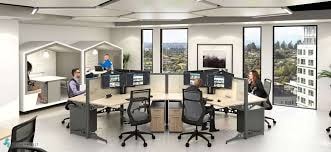
In a hybrid work environment, ergonomic furniture is essential to support employee health and productivity. Ergonomically designed furniture reduces the risk of musculoskeletal disorders and enhances comfort, allowing employees to work efficiently whether they are in the office or at home. Key elements of ergonomic furniture include adjustable chairs that provide proper lumbar support and can be customized to fit different body types and office workstations. Sit-stand desks are also popular, allowing employees to switch between sitting and standing positions throughout the day, which helps reduce fatigue and improve circulation.
Monitor stands and adjustable keyboard trays further contribute to an ergonomic setup by ensuring that screens and input devices are at the correct height and angle, reducing strain on the neck, shoulders, and wrists. By investing in ergonomic furniture, businesses can create a healthier work environment that supports the well-being of their employees, leading to increased satisfaction and productivity.
Modular Furniture for Flexibility
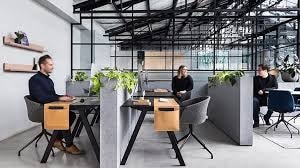
Modular furniture is a cornerstone of hybrid work environments due to its exceptional flexibility and adaptability. This type of furniture allows for easy reconfiguration, enabling businesses to quickly adjust office layouts to meet evolving needs. For example, modular desks can be arranged into individual workstations or grouped together for team collaborations, making it easy to transition between focused work and collaborative projects.
The benefits of modular furniture extend beyond flexibility. It also supports efficient use of space, which is particularly important in hybrid work environments where the number of in-office employees can fluctuate. Modular shelving units and storage solutions can be stacked, rearranged, or expanded to fit varying storage needs without occupying excessive space.
Another advantage of modular furniture is its ability to create a personalized workspace. Employees can customize their work areas with modular pieces that suit their specific tasks and preferences, enhancing comfort and productivity. This adaptability makes modular furniture a valuable investment for businesses aiming to create a versatile and dynamic office environment.
Adjustable Desks and Workstations
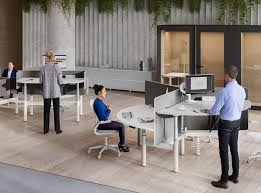
Adjustable desks and workstations are pivotal in hybrid work environments, offering versatility and promoting better health. These desks allow users to alternate between sitting and standing positions, which can help reduce the risk of sedentary lifestyle-related health issues such as back pain, obesity, and cardiovascular problems. By enabling movement and variation in posture throughout the day, adjustable desks can enhance comfort and productivity.
There are various types of adjustable desks available, from manual crank models to electric-powered versions with programmable settings. Some desks come with additional features such as integrated cable management systems and built-in power outlets, making them ideal for tech-savvy workplaces.
Workstations with adjustable components, such as monitor arms and keyboard trays, further contribute to an ergonomic setup. These elements can be customized to the user’s height and preferences, ensuring that their work environment supports good posture and minimizes strain. By investing in adjustable desks and workstations, businesses can create a flexible and health-conscious workspace that adapts to the needs of their employees.
Collaborative Spaces and Furniture
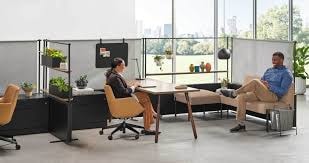
In hybrid work environments, collaborative spaces are essential for fostering teamwork and creativity. The right furniture can transform these areas into dynamic hubs for interaction and idea exchange. For instance, meeting pods offer a semi-enclosed space that can accommodate small groups, providing both privacy and an open feel conducive to brainstorming sessions. These pods are often equipped with built-in technology, such as screens and power outlets, enhancing their functionality.
Collaborative desks are another key element, designed to facilitate group work by allowing multiple users to share a single workspace. These desks often feature integrated power solutions and flexible layouts that can be easily rearranged to suit different team sizes and project needs. Additionally, mobile whiteboards and movable partitions can further enhance the adaptability of collaborative spaces, allowing teams to create customized environments that support their specific workflows. By investing in versatile collaborative furniture, businesses can encourage interaction and innovation, crucial for success in a hybrid work model.
Privacy Solutions for Hybrid Offices
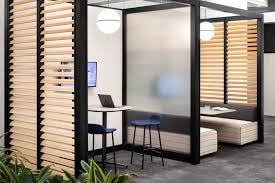
Privacy is a crucial consideration in hybrid work environments, where employees may need quiet, secluded areas to focus or conduct private conversations. Privacy solutions in office furniture can help create these spaces without the need for permanent walls or extensive renovations.
Acoustic panels are an effective solution for reducing noise and creating a more private atmosphere. These panels can be easily installed around desks or meeting areas to absorb sound and minimize distractions. They come in various designs and colors, allowing businesses to maintain aesthetic cohesion while enhancing functionality.
Privacy booths are another excellent option, providing enclosed spaces where employees can make phone calls, participate in video conferences, or work without interruptions. These booths are often equipped with soundproofing materials and ventilation systems, ensuring comfort and confidentiality. By incorporating a range of privacy solutions such as acoustic panels and privacy booths, businesses can create a balanced office environment that supports both collaborative work and individual focus, catering to the diverse needs of their hybrid workforce.
Technology Integration in Furniture
In the hybrid work environment, technology integration in office furniture is essential to support the seamless blending of remote and in-office work. Modern office furniture often incorporates built-in technological features that enhance functionality and connectivity.
For example office chairs, desks and tables equipped with integrated power outlets and USB ports allow employees to easily charge their devices without cluttering their workspaces with cables. Some advanced desks even come with wireless charging pads, providing a convenient way to keep smartphones and other gadgets powered throughout the day.
Smart desks with embedded touchscreens and IoT capabilities can adjust to user preferences, such as height settings and lighting conditions, contributing to a more personalized and efficient work experience. Additionally, chairs with embedded sensors can provide feedback on posture and recommend adjustments to promote ergonomic health.
By incorporating technology into office furniture, businesses can create a more efficient, connected, and adaptable workspace that meets the demands of a hybrid work model, enhancing productivity and employee satisfaction.
Storage Solutions for Hybrid Work
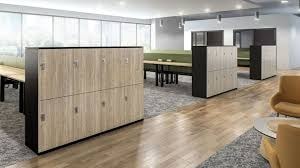
Efficient storage solutions are essential in hybrid work environments to keep workspaces organized and clutter-free. Hybrid work models often require versatile storage options that can accommodate both in-office and remote work needs.
Mobile storage units, such as rolling carts and cabinets, offer flexibility by allowing employees to move their storage wherever it’s needed. These units can be used to store office supplies, personal items, and important documents, making it easy for employees to transition between different workspaces.
Multi-functional storage furniture, like desks with built-in drawers or benches with hidden compartments, maximizes space utilization and keeps essential items within reach. Additionally, modular shelving systems can be reconfigured to fit various spaces and storage requirements, providing a scalable solution for growing businesses.
Lockable storage solutions are also important for maintaining security and privacy, especially when sensitive documents and personal belongings are involved. By implementing diverse and adaptable storage solutions, businesses can create a more organized and efficient hybrid work environment that supports productivity and convenience.
Sustainable Furniture Options
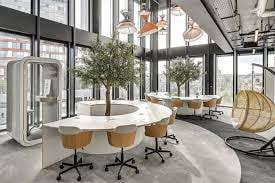
Sustainability is becoming a significant consideration in office design, especially in hybrid work environments. Sustainable office furniture is designed to minimize environmental impact through the use of eco-friendly materials and manufacturing processes. These pieces often incorporate recycled or renewable materials, such as reclaimed wood, recycled plastics, and sustainably sourced metals, reducing the demand for new resources.
In addition to materials, the durability and longevity of sustainable furniture contribute to its eco-friendliness. High-quality, durable furniture reduces the need for frequent replacements, thereby minimizing waste. Moreover, some sustainable furniture is designed to be easily disassembled and recycled at the end of its life cycle, further supporting environmental sustainability.
Many companies also seek certifications such as LEED (Leadership in Energy and Environmental Design) to ensure their furniture meets high environmental standards. By choosing sustainable furniture options, businesses can create a greener, healthier office environment that reflects their company’ commitment to sustainability and appeals to environmentally-conscious employees and clients.
Customizable Office Furniture
Customizable office furniture plays a crucial role in hybrid work environments by allowing businesses to tailor their workspace to meet specific needs and preferences. This adaptability is particularly important in many hybrid workplace settings, where flexibility and personalization are key to creating a productive and comfortable work environment.
Customizable desks, for instance, can be adjusted in height, width, and configuration to accommodate different tasks and work styles. Employees can personalize their workstations with features such as integrated storage, cable management systems, and ergonomic accessories, enhancing both comfort and efficiency.
Seating options also benefit from customization, with chairs offering product range of adjustable lumbar support, armrests, and seat depth to cater to individual ergonomic requirements. Modular furniture systems, which can be reconfigured to create various layouts and setups, provide the versatility needed to adapt to changing team dynamics and project needs.
By investing in customizable furniture, businesses can create a workspace that not only supports hybrid work models but also promotes employee satisfaction and well-being through personalized service and flexible solutions.
Budget-Friendly Hybrid Work Furniture
Creating an effective hybrid work environment doesn’t have to be expensive. There are several budget-friendly furniture solutions that can provide flexibility, functionality, and comfort without breaking the bank.
Start by prioritizing multi-functional furniture, which offers great value by serving multiple purposes. For example, desks with built-in storage can save money by eliminating the need for separate storage units. Consider investing in ergonomic chairs that are adjustable and provide proper support, as these can be found at various price points.
Second-hand or refurbished office furniture online, is another cost-effective option that can provide high-quality pieces at a fraction of the cost of new items. Many businesses upgrade their furniture regularly, creating a market for gently used office furniture that is still in excellent condition.
Additionally, look for modular furniture systems that can be expanded over time. This allows businesses to spread out the cost and invest gradually as needs change. By focusing on these budget-friendly options, businesses can create a functional and adaptable hybrid work environment without overspending.
Future Trends in Hybrid Work Furniture
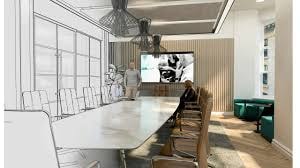
The future of hybrid work furniture is poised to see several exciting trends that will further enhance flexibility, functionality, and employee well-being. One significant trend is the rise of smart furniture, which integrates technology to create more intuitive and responsive workspaces. For example, smart desks with built-in sensors can adjust height automatically based on user preferences and provide reminders to change posture throughout the day.
Sustainability will continue to be a critical focus, with an increasing number of furniture manufacturers adopting eco-friendly materials and processes. Expect to see more furniture made from recycled and renewable resources, as well as pieces designed for easy disassembly and recycling at the end of their life cycle.
Another trend is the emphasis on biophilic design, which incorporates natural elements like plants, natural light, and organic materials into office furniture to enhance employee well-being and productivity. By staying ahead of these trends, businesses can create a modern, adaptable, and future-proof hybrid work environment.
Conclusion
In conclusion, the shift towards hybrid work environments has significantly influenced office furniture design, emphasizing flexibility, functionality, and employee well-being. As businesses continue to adapt to this model, investing in innovative furniture solutions becomes crucial for creating efficient and adaptable workspaces.
Key features such as ergonomic design, modularity, and technology integration play vital roles in supporting diverse work styles and needs. Privacy solutions and sustainable options further enhance the workspace, making it conducive to both collaborative and individual tasks.
By staying abreast of future trends, such as smart furniture and biophilic design, businesses can ensure their office environments remain modern and appealing. Budget-friendly options and customizable furniture also allow for a tailored approach that meets specific organizational needs without excessive expenditure.
Ultimately, the right office furniture can transform a hybrid workspace into a productive, comfortable, and future-proof, business environment, fostering a culture of flexibility and innovation.


